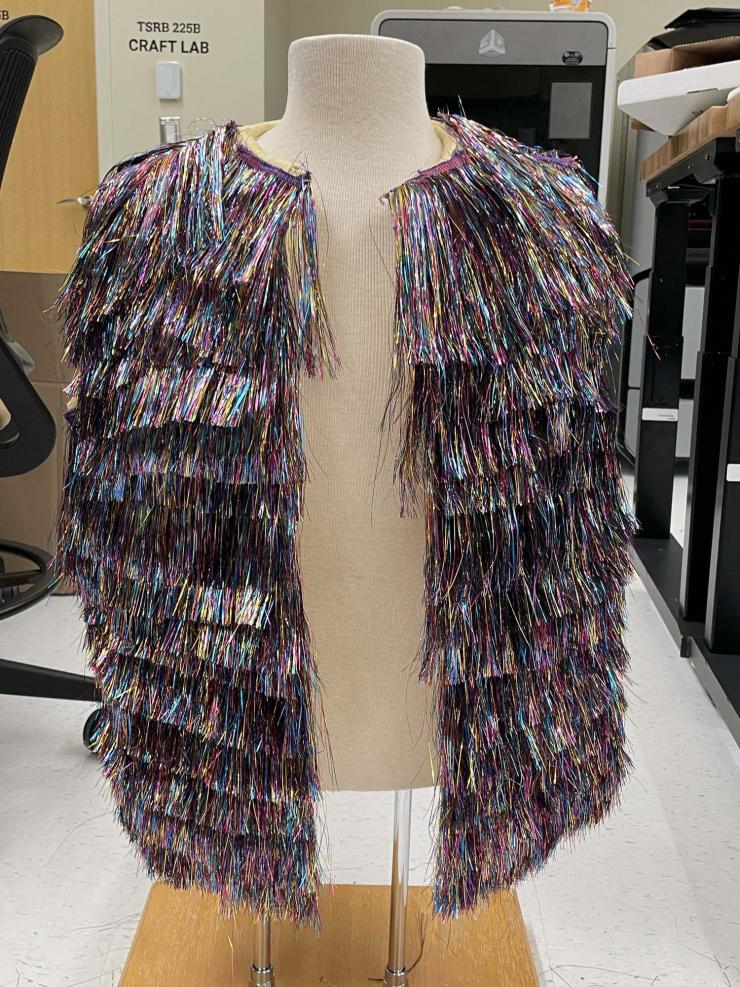Craft Lab is Tech’s Newest Makerspace
Dec 08, 2022 — Atlanta, GA

Pictured at the GVU Craft Lab ribbon cutting (left-to-right) are Clint Zeagler, Tim Trent, GVU's executive director Keith Edwards, and Beki Grinter, associate dean for faculty development in the College of Computing.
Opened on November 2, 2022, the newly launched Craft Lab is Georgia Tech’s most recently unveiled makerspace funded through technology fee and renovation funds. The lab is located in the Technology Square Research Building (TSRB) room 225B. This makerspace, sponsored by the Institute for People and Technology and the GVU Center, offers students hands-on, industrial tools to delve into computational craft, e-textiles, and soft electronics.
Some of the projects a student could build include creating touch sensitive clothing and flexible on body electronics—among unlimited options just in this realm of thought. A creator can employ digital textile fabrication mixed with hand crafted designs blended with technology to make new functional items or use the lab to create expressive art through a variety of craft-related mediums. Equipment available to students span the areas of electronics, knitting, metal, sewing, wire, embroidery, 3D printing, fabric, and paper. While this is a new lab space, users of the space have already included students from the College of Computing, College of Engineering (mechanical and electrical engineering students), College of Design (industrial design students), School of Physics, GVU, and the School of Literature, Media, and Communication (digital media students).
Before the Craft Lab was formalized, a small nook with embroidery and sewing machines existed in GVU to support on-body interactions research using conductive textiles. Research was led by Thad Starner, professor in Interactive Computing and leader of the Contextual Computing Group. Key members of the project at the time were Scott Gilliland and Clint Zeagler (both now senior research scientists in IPaT). Gilliland offered technical expertise to projects while Zeagler’s love of working with fabrics, textiles, and textile manipulations to create on body interfaces led him to acquire a handful of large, industrial embroidery and sewing equipment machines.
According to Zeagler, “interest in using these machines grew resulting in the presentation of several science papers at academic conferences. We began to realize there were students that wanted to use the machines, but couldn’t because there was no infrastructure in place to train people or simply help them use these industrial machines.”
Tim Trent, research technologist with GVU and manager of the Craft Lab, pitched the idea of a dedicated space in TSRB to relocate the machines, add new equipment, enable easy access, and continue the work of Starner, Gilliland, and Zeagler while creating processes and procedures to foster learning, training, and safety similar to the existing GVU Prototyping Lab, also managed by Trent.
The Craft Lab immediately began supporting educational courses when Yaling Liu, an instructor in Industrial Design, discovered the makerspace lab. She teaches a course called soft goods design which focuses on product opportunities that highlight the user and environmental benefits from soft, sustainable material explorations. Her course also explores ways of incorporating social trends that satisfy consumers’ desire for responsibility, functionality, inclusivity, and aesthetics.
“It thrilled me to find out about the existence of the Craft Lab, which provides a distinct set of tools for industrial design (ID). The Craft Lab fills in the missing parts of the resource that ID students need,” said Liu. “For the ID Soft Goods Design course, it has been challenging to find a dedicated place that provides the relevant tools that the course needs. I was so glad to find out that the Craft Lab offers a great selection of machines and a generous working space. At the lab, I have easy access to the resources that make lectures and projects run more efficiently.”
Of course, the Craft Lab was primarily created for student use and Arianna Mastali wasted no time putting it to good use. Mastali is a master’s student studying human computer interaction at Georgia Tech.
“The Craft Lab has been very useful for me as a resource to further my crafting skills,” said Mastali. “I actually learned how to sew while at Georgia Tech from learning how to make letter shirts in my band service fraternity. Now, that knowledge has come in handy in my research involving wearable technology for canine athletes.”
“I have been working on a research team in the animal-centered computing lab and we created a wearable activity and gait detection monitor for sled dogs and other canine athletes. As a part of this prototype, we needed a soft pouch for the wearable device to be placed in and connect to the dog’s harness. This was where my sewing skills came in handy when I created pockets made out of neoprene. I am sure that my sewing skills will be needed again someday for research in wearables, so it’s nice to know that the Craft Lab will be there when that day comes.”
She’s also had fun using the Craft Lab for a personal project—once creating an extravagant, rainbow tinsel vest to wear at a concert. “I got so many compliments on my vest from friends and concert goers,“ said Mastali. “It took me about two days to make the vest. And I really felt great about my Georgia Tech Craft Lab creation when someone asked me, ‘so, where did you buy that vest?.’”

Arianna Mastali's vest





